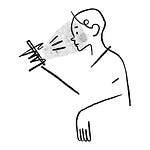The conversation continues over drinks as Tsh Oxenreider and Seth Haines talk about Advent, why leaning into the liturgical calendar's rhythms is a gift, and how it's an outcome of thinking more sacramentally.
Seth’s website and newsletter
Tsh’s website and newsletter
Order Shadow & Light and join the Advent Community
The Liturgical Year: The Spiraling Adventure of the Spiritual Life, by Joan Chittister
Offerings, by Typhoon
The Divine Comedy, by Dante Alighieri
Browse Tsh’s recommended books
Pay what you want for Tsh’s audio workshop, Create Your Rule of Life
Check out the shoes and bags right now at Rothys.com/GOODLIST
Visit StoryWorth.com/tsh for $10 off your first purchase
Tsh: This is The Good List. I'm Tsh Oxenreider.
In this episode, I'm joined by my friend and fellow writer, Seth Haines, as we continue our multi-episode conversation about sacramental living. Seth, before we dive into this episode topic, the specific one, can you remind us what we mean when we say sacramental living? How would you define that in one to two sentences?
Seth: To me, sacramental living means seeing all creative things as a sort of doorway to experience the goodness of God in life. To live sacramentally to me is to see food, drink, relationships, and even time, which is today's episode, as its avenue for experiencing God's grace.
Tsh: Perfect. And mostly for fun, but also because this idea actually embodies the idea of sacramentality, you mentioned food and drink, we're also calling this conversation series A Drink with a Friend. Seth, what are you drinking for our particular episode?
Seth: Today I'm drinking tea. Your listeners can't hear this, but it is in a white mug, which is very Spartan and simple and boring, but the tea in it is anything but, it's an oolong tea, and it's an organic oolong tea that I really love.
Tsh: Cool. I like it.
Seth: What are you drinking?
Tsh: My answer might be one step more basic than yours, and that is black coffee. It is black coffee because it's been a doozy of a week because it's not yet noon as we record this, and because just because I need it. The mug I'm drinking out of though is the Black Dog Cafe. I don't know if you've ever been to Martha's Vineyard in Massachusetts.
Seth: No.
Tsh: Kyle and I went there on our anniversary and then we went there on our ten year, no, we went there on our honeymoon, I should say. To me, it's very fall-ish because our anniversary is in the fall and we went there as kids basically because that's how it felt like when we got married and we were wowed by New England in the fall and so I like it.
Seth: When you're drinking black coffee, is there a certain default coffee for you? Like a brand?
Tsh: The brand is local and that's the one that's 200 steps from our house, literally. We have a coffee shop that's behind our house. It's 309. We're kind of spoiled in our neighborhood because we live in a super walkable historic neighborhood, and they turned a house into a coffee shop and it's basically our backyard. They roast coffee there. But it is the, we have talked about this, the Ethiopian, is it Yirgacheffe that tastes like blueberries? Is that it?
Seth: Yes.
Tsh: That is my favorite and that's what I like to drink when I drink it black, which is most of the time. That's probably what's in here.
Seth: I love being spoiled by good coffee and good location. We have Onyx coffee here. They're a local roaster, they ship out everywhere.
Tsh: What's his name? Prop.
Seth: Propaganda. They've got a new line together and in fact Propaganda was over not too long ago in our neck of the woods. We spent a little time with them. It was a lot of fun, but like he his has teamed up with some really good people because man, that Onyx coffee, I could drink it all day long.
Tsh: I saw that Instagram of your wife's Amber, him in a granny rocking chair and quilt or something like that. It was funny.
Seth: Yeah. He said, and I quote, “I’m from LA. I'm very cold.” It was like 70 degrees or something. So we gave him a quilt and he liked it.
Tsh: I love it. Perfect. That's great.
To move on to the main topic here, you already hinted at it. We're going to be talking about time, sacramental time and more specifically the liturgical calendar, which is the scaffolding for that time. This is a term that probably a lot of people may have heard of, but I've no idea what the heck we're talking about. And maybe even specifically the season of advent, which is the first part of that liturgical calendar, people probably associate it with the countdown to Christmas, maybe with some grocery store calendar where it's got mediocre chocolate you eat once a day. and that's about all they know of. And that's understandable because our culture really doesn't do the liturgical calendar. We're going to talk about that, what that looks like for us, what we do, what we don't do, what we're still learning and how to make it work for us and our families, because we both have kids and jobs and all the things. Seth, start us off. Tell me a little bit about your backstory with what you know of the liturgical calendar.
Seth: I grew up in a really weird sort of world, you know this, I was in fourth grade when my parents moved my sister and me out of public school and into Catholic school. They will not Catholic. I was raised Baptist. We moved into Catholic school. From fourth to ninth grade, I was in Catholic school. My dad actually became Catholic maybe when I was in fifth grade. I had this really weird dual experience, where every year while I was in school, we would experience things like Advent and like Lent. I would go through all the Advent rituals of the liturgical year with my classmates and then I would go home and there was no Advent calendar or anything. And then same for Lent, right? It was like, oh, there's this thing called Lent, I kind of understand it, but it don't really practice it. About the only thing that we had that came close to that was that the month of July, in the Baptist church where we celebrated God and Country month and had flags everywhere and Marines walk down the aisle on the Sunday before or after the fourth, it was sort of nationalistic experience. That’s about the only thing that we had that was kind of a liturgical calendar was July the fourth. But a few years ago I ran across this little book by Joan Chittister called The Liturgical Year, and for me, it really did recast and reframe and help me understand the importance of the liturgical year. That’s something that I'm still growing in, that I'm still trying to understand more and more of.
Tsh: Yeah, that's cool. I have to ask, so fourth through ninth grade is a pretty formative year in a kid's life. Was it confusing to you to have it be one way at school and one way at home, knowing you were both, this was a Christian environment and then you go home, your family's a Christian family and yet some do things and others don't.
Seth: Maybe. I mean, I was really a Christian mutt, so to speak. So I was raised Baptist. My mother became a Christian in the charismatic renewal of the Episcopalian church. My grandparents were Episcopalian, and people on my mom's side were Episcopalian. My dad's side was Church of Christ and then I was in this Catholic school. To me, the sort of faith became this massive melting pot. There was just so much, I guess, the difference in the practices of all the people in my life that I don't really know that I thought about it one way or another. It wasn't confusing because everything was confusing.
Tsh: I totally get it. I just remember, even as a kid, not even understanding what denominations were, it almost felt like teams or something, and I couldn't figure out why we divided like that, which is a whole other thing. But at the time it was just like, well, okay, I guess we're just going to go over here and take our ball over here and play and I didn't think much of it until I was probably in high school.
Seth: Did you grow up with people on both sides of your family in different kinds of denominations or were you pretty much straight down the middle, everyone was the same.
Tsh: Well, I was definitely Protestant and definitely low church Protestant. That's not a disparaging term. It just meant that we didn't really subscribe to anything liturgical or anything that would be conceived as high art church. My mom grew up Assemblies of God. A lot of my family on that side is still Assemblies of God, in your neck of the woods, actually in the Ozarks. Then my dad grew up, I guess you could say Assemblies of God as well, but they weren't quite as Pentecostal maybe. But then by the time I was a kid, we were mostly non-denominational. I kind of joked that by the time I was in sixth grade, we started going to a big Texas church. Texas is not in want of many churches on every corner, and this is just your classic large, I don't know if we were using the term seeker-sensitive yet in this era of the late eighties, but it was definitely of that flavor. And yet it was very, I mean, it was in all things but named Baptist. It was very much Bible-focused. It was very sola scriptura. The good thing about that is that I learned a heck of a lot of the Bible growing up and to this day, I'm grateful for that. I learned a lot of the Bible. And yet, the other side of that coin is, if it didn't show up explicitly in scripture, we didn't do it and that's the liturgical calendar. I just didn't know anything about it. To me, it just kind of came across as like the extra fluffy things that those other denominations that I know nothing about did. So I didn't know anything about it until I was an adult, well into my adulthood, I think.
Seth: When you say, when you say sola scripture, you mean the Bible alone. Because it wasn't lined out in the Bible, like, hey, from the day after Thanksgiving until Christmas, we do this and then the next 12 whatever days we do this, because that wasn't a thing. It wasn't practiced?
Tsh: Yeah. Which of course, that didn't mean we didn't do other things that weren't in the Bible, but yes, if it was associated with anything related to a high church experience, we didn't do it. To me, Advent, I had heard of it. I knew that there was candles associated with it, that people sometimes lit them and then maybe you read a Bible verse, but that's all I knew. To me, it was just the countdown to Christmas and that’s the gist of what I knew. I knew nothing else about the rest of the calendar. Even Lent to me, we did not remotely do Lent. All the holidays, Easter and Christmas, those were definitely one day long and that was it. That was my experience. And I'll bet you, it's the experience of a lot of people, at least here in the US. I say a lot of people, a lot of Protestants or a lot of people in our sphere, so that's my backstory and of course now here I am several decades later and I wrote a book about Advent. It has definitely come to mean a lot to me now as an adult. But I'm curious, Seth, you and your wife have four kids, have y'all ever intentionally done anything for Advent in your home?
Seth: Oh yeah. We do it every year and we have for years. We do, what did you call it, the mediocre chocolate? The calendar with the mediocre chocolate. Oh man, that stuff's the worst. In fact, last year or two years ago, we had one of those and the kids very graciously offered me the mediocre chocolate. I said with the graciousness of my heart said, no, no, no, you can go ahead and have that, being generous. But really, I just hate that stuff. Last year, maybe that was three years ago because last year, Amber had a different system where she like actually bought chocolate to put in the Advent calendar and you would open the door on the first day of Advent. Here's a scripture and here's a chocolate and we read it together and eat the chocolate or whatever. And we also have these little ornaments, that correspond with a different day and a different symbol throughout Advent. We'll put those in the drawer too. So you pull it out, you pull out the little symbol, which is typically a symbol from the scriptures. And then you read the scriptures about it and then hang that on the tree as an ornament.
But I think one of the things that's always been really hard for me about both Advent and Lent, but particularly Lent, is that I forget that we're in that time. I can't quite get into the groove of it. Then maybe like 15 days in when I finally get into the groove of it and then all of a sudden it's Christmas or it's Easter. I’ve had a really hard time if I'm being honest, like really submitting to the current, to that current change, that rhythm of change that leads us into those holidays. I wonder if you have experienced that or if you're somehow transcending it and if so, how?
Tsh: I'm kind of with you there though. I will say the past few years I've gotten much better at that, but it's not because I've like unlocked the key to being super spiritual at Advent. To me is all about, honestly, a lot of the sacramentality, it's a lot of outward stuff. It's a lot of tactile sensory, forced rhythms around me so that I don't forget stuff, which is right in line with this conversation. To give a little, I guess, backstory for that, I had wanted to do Advent for quite a while, since my oldest was, I remember really trying to spearhead this Advent tradition in our family when my oldest was in first grade and she's now a sophomore in high school. We started off doing a little calendar, you know, of course, thinking at the time that Advent started December 1st, like every year, not realizing, oh, it's the four Sundays before Christmas. There are times like in 2020, it starts November 29th. But at the time, I didn't know that. So December 1st where we had flipped over the calendar, and then there was like a little activity to do, cut out paper snowflakes, make this craft, watch this movie, bake cookies. This is when we live in Oregon, snowball fight, make a snowman, make hot chocolate. I was doing this in the name of being a good mom, because at the time I felt like that's what good moms do. And of course I had a one-year-old and I have no idea how old Reed was at the time, but I had three little kids, but the reason I did, it's not because I felt like this is what my kids wanted, it was because I felt like this is what I wanted. It wasn't until later I realized, oh, I don't actually want that. But at the time, this is what I thought. It's totally great if people want to do these things, I just thought that that's what I wanted. But it was honestly like by day 10, I was burned out. I was like, I can't wait for the holidays to be over and that's not good because we're not done yet.
Fast forward several years to where we were going to go backpacking around the world for a year. I told Kyle the Christmas before, the holiday season before, oh my gosh, I can't wait until next year when nothing will be expected of us. Like we do not have to go to holiday things. We don't even have to get a tree. The kids will barely assume we're getting gifts because we're living out of backpacks. I just can't wait for that holiday season. The following year when we did that, and we had a really simple, we made homemade paper stockings and hardly did anything. It was delightful. It felt like a reset button so that when we returned and started living like normal people again, I realized, okay, I'm going to do this, but I'm going to do it the way that works best for us. I admitted to myself at that moment that I was, well, not at that moment, but I owned the fact that I'm not a crafty mom. I am all for providing the pieces of cardboard and hot glue guns and cotton balls for whoever wants to do anything, but I'm not going to sit there and do that with them and that's okay because I am a good mom in other ways. I'm the storytime mom, I'm the reading out loud mom. I also cook and bake and all these other things and this is okay. Anyway, I'm rabbit trailing now. But my point is we wrap up a lot of our identity and a lot of our ideas of what the holidays should be based on what we think we want for the kids. But then it turns out our kids don't really want that as much as they want a sense of rhythm, of the time mattering and almost the sensory input that this is a place where I belong. But I had forgotten that. To me ultimately, that's what the liturgical calendar gives us is this permission to make our time mean something. I lost that. That's where I'm at now, where I realize, oh, it's about making this matter so much more than checking the boxes.
Seth: It's the idea of incorporating your kids into the time, into the formative time. Is that right?
Tsh: Uh-huh, and to backup about what the liturgical calendar does is, it starts off at Advent. Advent is, the first day of Advent is a little new year, which doesn't line up with our calendar year at all because it's late November, early December, but then it walks us through the life of Christ in one calendar year, more or less. Where we start off with the birth of Christ, which is obviously Christmas and then all the way to Easter with some other moments in between with Jesus's resurrection and then leading into ordinary time, well, Pentecost and ordinary time. I say all this to say, this is where we recognize time and that it moves, but that it's also circular because here we are celebrating Advent again like we did last year and like we've done for decades and centuries and all the way to the first incarnation. We recognize that we're part of time when we celebrate advent. We recognize that we're part of this whole thing God is doing here and it's easy to forget that in the midst of carpool lines and work deadlines and getting dinner on the table and working out and all the things of life. It gives us permission to make this time mean something.
Seth: I think it's easy to forget that particularly as time seems to progress forward as society changes, as business changes, as families change, as your kids get older, as you get older, it's easy to forget that we're actually inside of a bigger story that actually has a beginning and a culmination and that that culmination, at least for the person who believes in the Christian faith, that that culmination happened at the resurrection and it happens every Sunday after that, right? Every Sunday we're incorporated back into that bigger story of the life of Christ. For me, I think that's where I keep getting reminded that these seasons are important, right? Because every year I get Advent. Every year I get Lent and some years I don't do Advent and Christmas well. I don't do Lent and Easter well, and I don't do Pentecost well or whatever, but the idea is that because the cycle continues because I'm constantly incorporated into the life of Christ, into the time of Christ that I can do incrementally better every year, I can grow a little bit better at doing Advent every year as I grow in the formation of this larger Christian story.
For me, it's just that reminder that like, hey, there's a bigger story, time is wrapped up in that bigger story ad as a participant in time, I get to participate in that bigger story.
[AD BREAK]
Tsh: I really liked that you used the vocabulary “bigger story” because I've written about this before we, especially, I would say our generation, we've been told most of our lives, at least American culture, to live a big story, that that message of make our lives matter and make an account, that involves doing big and great things, they live a great story of mine and what something like the liturgical calendar reminds us of is that it's actually not our one individual story that needs to count. It's being part of the bigger universal story of what God is doing and it's actually really okay not only that my life is ordinary and not that big, but perhaps it's even better that way. I don't want to say it's like, I'm finding my place as though, no, no, no, be quiet, don’t make a big scene of yourself. It's more this idea of recognizing life is not about me. I think that's what this calendar does really well. From the beginning of Advent all the way through, it's a reminder that I am part of a collective body and that we're all pointed in the same direction, which is God's story and thankfully it's not about me because that's a lot of pressure to make my life about me.
Seth: Yeah. 100%. I think that’s one of the problems with having this sort of one and done idea of the holidays that you have this one big event that is Christmas or this one big event that is Easter or this one big event that's Thanksgiving, is that you do tend to make it a little bit more about you. I remember thinking if you don't get the exact meal that you want to Christmas or the exact present that you want at Christmas, that somehow it was a fail because so much is riding on that one day, you know? But there's something about living into the rhythm of the bigger story that takes the pressure off that one day and allows it to be a celebration of what it really is.
Tsh: I actually feel like that's one of my favorite things about Advent ultimately is that it forces us to slow down because it's not just one day. The entire calendar wraps up all of our time. We're not not part of the liturgical calendar at any one moment. But Advent in particular, the whole point is to anticipate and to wait. The word itself means wait. It's so antithetical to our normal pace of life when we are subconsciously thinking that the day is about checking off a to-do list or that we matter when we get a lot done, instead, Advent is an invitation. It's a gift. It's not a burden. It's an invitation to slow down, remember life is not about me and to actually enjoy the buildup to the fullness of the Christmas season.
I describe it a lot, like the feeling, and you have a younger one as well, so you might still have this, the way kids get at Christmas when they just can't wait and ultimately the waiting for Christmas is almost more fun than Christmas itself and how, I don't know if you've ever had this, but one of your kids will say only eight more days till Christmas and they're saying that like a good thing and you're as an adult, panicking when they say that like, oh crap.
Seth: Have I gotten all the right things?
Tsh: Yeah. That's not good, oh my gosh. What Advent does is it gives us that grace to be like, okay, it's not here yet and even with the kids, it gives them the grace to slow down, to enjoy the anticipation, to recognize that that's part of the gig, that it's not all about December 25th and especially because within the calendar, Christmastide as 12 full days long. That's a whole other thing, but Advent is intentionally slow on purpose. It's intentionally not terribly prescriptive. There’s not a lot of “thou shalt do” this and this and this on purpose, I think because it's so much more about inward posture than it is about outward stuff.
Seth: Have you, just out of curiosity, have you attended or been to a midnight mass yet?
Tsh: No, I haven’t.
Seth: You’ve go to do that this year.
Tsh: We are, we are, we are, we are.
Seth: That’s so perfect. For me, that is the ultimate culmination of Advent. That experience to me and I've been doing it for years, really since probably high school even when Amber and I were first married, I would sneak off and go find some midnight service and go to a midnight mass. But to me it really does put a nice bookend on Advent, and just say, okay, now we're transitioning to the stable, we’re transitioning to Christmastide and to Christmas day. It is my favorite by far, my favorite service in the year by far.
Tsh: Nice, nice. Okay. That'll be a new thing for me to look forward to because every year, since I wrote a dang book on Advent, I feel like, gosh, it's surprising to me how much more there is for me to unpack and learn about and grow every season. That's even true this year when I've got this book out, that there are new things to experience like this. I'm really excited about that.
Along that, I feel like this is a good, this isn't a blatant plug for the book, but one of the things I wrote the book for was so that all sorts of people, those who grew up going to midnight mass for years, all the way to, they are just now learning what this word means in our conversation right here could get something out of it. The reason is because I think once we get into the idea of Advent and we say like, okay, I'm on board. This sounds good to me. We suddenly get overwhelmed with all these either ideas or things to do or ways we want to incorporate it into our home life and then we get overwhelmed either because there's too many things we want to try to do, or because we freeze because we don't know what to do. The book is intentionally open and go, meaning if you have to skip three or four days of reading a book, you're not behind. I don't know if you've ever had some of these Advent things where you have to follow a story. I didn't want that.
Seth: Yeah. You miss one or two of those and you feel like you've let everybody down.
Tsh: Yeah.Sorry, kids. We're going to have an hour and a half of reading tonight so that we can catch up and that's just not reality. But I also wanted to use the Psalms as our walkthrough for Advent, because first of all, it's poetry and it’s the mass reading of, of the church and of the Old Testament and of the tradition of Christ. But I also, I feel like, you and I've talked about before the poetry slows us down and forces us to think, and because it's not so literal, it's a lot of metaphor. It's a lot of language play. To me, the holidays are a great time to stop light a candle, get cozy and actually read some poetry. And the Bible actually has a lot of poetry. That's what the book is instead of necessarily, a beginning and end story, it's a walkthrough this inward stuff that we want to wrestle with, but don't feel like we have permission to because we have so many holiday things to do.
Seth: Tell me about the title, Shadow and Light. Why that title?
Tsh: Why the title? I don't know if you've ever heard the idea of Advent being darkness to light or we're walking in a direction, but that's the visual I've always had about Advent ever since I knew what it was. We light candles at Advent, but the candles are somewhat symbolic of the anticipation of the birth of Christ because you light one at a time. Week one, you light one candle, week two, you light that first week's candle and the second candle and so on and so forth to where by Christmas, you're lighting five candles, you've got the four weeks and then the Christmas candle. But besides that, to me, there's this already not yet-ness with Advent because we're recognizing a historic event that already happened. Jesus was born, 2,000 plus years ago, and so we're remembering that, but there's also this not-yet season where we're living in this in-between time. For those of us who are Christians, we recognize that the world does not yet been redeemed fully or made new and rights have not been fully wronged. I mean, wrongs have not been fully righted yet. Strike that reversal. We're still living a little bit in the shadows. Advent is also a reminder of what we're still waiting for, that we're still in the not-yet season. That's what the title is about.
Seth: That's good. As we're recording this, we're recording it a little bit early, but as we're recording this, we just cut off the second presidential debate. I know that politics don't want to talk about that, but it is a stark reminder that we are living in the not yet. We look for a bigger kingdom. We look for justice, we look for peace, we look for mercy. It's just a reminder as we go through this political season that like, man, we've got a long way to go.
Tsh: Yeah. And I mean, heck politics aside, just 2020. I mean, 2020 is a hot dumpster fire of a mess for everybody around the world. If we need a more stark reminder of things not being as they should be, all we have to do is look around, gestures broadly at the entire world. We're all living in the not yet.
Seth: Or go try to have a cup of coffee with a friend at a coffee shop or a restaurant. You can't do it. It is not yet.
Tsh: It's amazing. Advent, I mean, I couldn't have planned this, but to have a book about Advent come out in a year like this, a lot of us are going to be at home for a lot of the holidays. We want that coffee with a friend remembering that everything will be made new at some point, all the things that we know are supposed to be, but aren't, we can give ourselves little reminders of that at home through daily reading of poetry, like the Psalms, through lighting of candles, through listening to good music and art, because that's part of this book as well. Through just talking about it as a family, without all the right answers, but at least making this a regular thing you do together even if it's like five minutes long, because you're remembering that one day things will be okay, even if they're not okay right now.
Seth: We're going to use your book at the Haines family. We've already talked about it. We're excited about it. I'm excited about it. I'm going to learn from you. I'm going to keep learning from you.
Tsh: Very cool. All right. Seth let's each share what one thing, habit, idea, or work of art that is currently making our life a little bit better. We've paired what we're drinking in this episode with us, at least sorta kind of, mine's a bit of a stretch, but I still want to hear what yours is. Start us off by telling us what's on your good list right now and how it pairs with your oolong tea.
Seth: On my good list right now, I was really torn between a couple of different things. This is an old thing, oldish thing. It's Typhoon’s album, Offerings, which I don't know if you listen to that.
Tsh: We’ve talked about Typhoon before. You and I had this whole conversation about how they're like Arcade Fire, but with hope.
Seth: Yes. Right. There's a little bit of sentimentality there, but the artistry, the poetry, the thematic writing is so beautiful. I like their album, White Lighter a lot, actually love their album White Lighter. I wrote most of my last book to Typhoon, In the Old Hellos, but that's totally different band. Their album, Offerings is about a journey of a man actually from, it's a relational album. It's about his marriage and his journey from dementia to death and then ultimately to the afterlife, if you can listen to the last song without bursting into tears, you are not human, you are an Android. It's just an amazing album and it's an album that really does like look back at time and chronologize time and show the eternality of time. That album pairs really well with the idea of liturgical year in the consummation of all time living in time and what that means. It also pairs well with oolong, not because there are any references to oolong tea in said album, but because as I was listening to that album and ingesting it when it came out, I was sitting at a coffee shop, local coffee shop called Puritan. For the most part, I was drinking oolong tea. It just all fits together. What’s your art? What’s your thing?
Tsh: Yeah, this is funny. I’m drinking black coffee, which is stark, it's yeah, it's dark. My thing is Inferno by Dante Alighieri. I don't know if you've had The Divine Comedy, but I am just now reading it for the first time. I like that you talked about Typhoons being a journey, that album, because this is the journey to hell, purgatory and heaven that most art post 1302 has used as its foundation for describing what it's like to walk through the journey of hell and out via redemption. I was reading this past week, how foundational Dante’s work is, The Divine Comedy. To me, it's so funny because this is the holidays and I'm reading Inferno, and I'm actually reading it with my high school students. That is the official excuse. I often joke with them, I'm assigning you books that I want to read, or I have already read, and I want you to read because it's good for you, but this is the book that has been on my bucket list forever. We're reading Inferno, what better way to say the holidays are coming than a book about hell.
Seth: I think that's hilarious. I will say too, and we didn't plan this. This was not planned. But the album Offering has Dante references in it, as you said, because a lot of journey type of art, has those sort of divine yet divine comedy references, Dante references in them. That’s awesome.
Tsh: We're going to have a whole class coming soon just about the art of Divine Comedy and where we see it in art, ancient, medieval to now and then I'm going to have all the kids draw their circles of hell.
Seth: You should totally make them listen to Offerings while you do it.
Tsh: Okay. I'm going to do that. I'm adding it to the list. There you go. Nothing says it's Advent like a book about hell, but that's what I'm reading.
[LISTENER VOICEMAIL]
Hi, my name is Kelsey and I'm calling from Lake Forest, Illinois. The thing that's on my good list this week is receiving your new book in the mail, Shadow and Light. I'm so glad I chose to give myself this gift this year as you encouraged me to do on your last podcast. It's such a beautiful book and it's making me so look forward to the Advent season this year. Thank you for making it. Bye.
Tsh: Thank you to Kelsey for sharing with us what's on your good list and I would love to hear from you as well so call and leave a short voicemail at (401) 684-GOOD. Tell us a habit, idea, thing, or work of art that is making your life better these days.
You can find my work at tshoxenreider.com where you'll find links to my books, my audio series about creating a rule of life and my weekly newsletter called Five Quick Things. As we talked about in this episode, Advent 2020 begins Sunday, November 29th. Head to shadowandlightadvent.com to get your copy of the book, to join the free community, and to find accompanying resources like music and art to make it all a season you want to enjoy this year. Seth, where can we find you in your work?
Seth: You can find me at sethhaines.com sethhaines.substack.com for my newsletter, and then like anywhere where you use the little ampersand symbol @, it's @sethhaines.
Tsh: Cool. Music for the show is by Kevin McCloud and thanks as always to Caroline TeSelle and Kyle Oxenreider for their help, as well as my furry intern, Ginny. I'm Tsh Oxenreider and Seth and I will be back here with you soon. Thanks for listening to The Good List and Seth, thanks again for joining me.
Seth: Thanks. This was fun as always.












Advent (with Seth Haines)